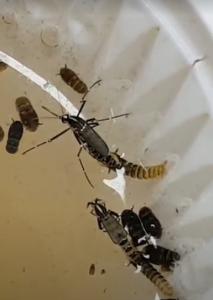[ad_1]

Karachi, Nov 02 (IPS) – Twenty-three-year-old Sarah Tajammal felt a way of “impending doom” as she fought excessive fever, nausea, bouts of vomiting and excessive fatigue after being identified with dengue two weeks again.
Residing in Lahore’s DHA space, which has reported probably the most dengue instances “due to the damp inexperienced setting”, she could have caught it at house, or when she went on a tree plantation drive organized by her workplace, she informed IPS over the telephone from the jap metropolis within the Punjab province.
In Punjab, the quantity has crossed 11,000 new instances proceed to rise. With two and three sufferers occupying a hospital mattress, in accordance with information stories, many had been pressured to put on stretchers in corridors.
Tajammal was fortunate. Her situation didn’t attain that vital stage. Her fever subsided in three days although nausea and vomiting continued to hound her for per week.
Two weeks later, she feels nearly new and is gaining again her power.

But when there may be one lesson she has learnt, it’s by no means to underestimate the facility of the diminutive flying fly. “I’d keep away from going outdoor until it will get chilly sufficient for the mosquito to die,” she stated.
It was again in 1994 when dengue was first reported in Pakistan, nevertheless it was not till 2005 when the primary epidemic occurred in Karachi. Since 2010, Pakistan has been experiencing an epidemic-like state of affairs in three provinces of Khyber Pakhtunkhwa (KP), Punjab and Sindh.
Whereas Lahore continues to battle the dengue virus, issues usually are not wanting too good within the port metropolis of Karachi both.
“We’re seeing a great deal of dengue instances. It appears to have changed Covid-19,” admitted Dr Naseem Salahuddin, heading the infectious illnesses division at Karachi’s The Indus Hospital. These with gentle or reasonable dengue are despatched house with directions suggested to point out up for a follow-up,” she added.
The unfold of dengue from Karachi to Lahore and from Lahore to completely different elements of the Punjab after which to comparatively temperate zones of KP in recent times point out that Aedes mosquitoes have gone by means of “adaptation to comparatively temperate zones”, defined Dr Erum Khan, professor of microbiology on the division of pathology and laboratory drugs on the Aga Khan College, in Karachi. She stated local weather change, together with a runway inhabitants, urbanization and enhance in journey and transportation, is stoking it additional.
“The severity of the illness has elevated, however the authorities’s enter is inconsistent and with none long run illness management technique,” lamented Khan.
Whereas mortality is excessive amongst sufferers who are available late in the middle of the an infection, Salahuddin stated it was necessary to maintain a detailed eye on the affected person whereas holding a “stability” between giving simply sufficient fluid however “not overloading” the affected person with it.
On the identical time, whereas hospitals in Karachi can handle remedy, she feared in future, “instances are going to get increasingly extreme and greater and greater numbers and a time could come when hospitals could change into overburdened”.
That’s the reason healthcare professionals like her can’t emphasize sufficient for the town administration to wash up the town of rubbish and swimming pools of water from rain or overflowing gutters and damaged pipelines.
In any other case, warned Salahuddin, there may be going to be one other well being catastrophe for the general public. “Cleansing of the town is our solely probability,” she identified.
“On condition that majority of the inhabitants have no idea about whether or not they had been ever contaminated earlier than, the state of affairs in Pakistan can worsen in future outbreaks,” warned Dr Ijaz Ali, a virologist at Islamabad’s Comsats College.
Unhealthy governance, the lack to grasp the mosquito’s behaviour or habitat, and refusal to permit analysis or use established scientific strategies in different nations had been a few of the limitations to controlling the Aedes mosquito inhabitants in Pakistan, stated Ali.
“Sporadic recurrence of dengue every year and emergence of chikungunya and zika factors in the direction of the failure of current methods, if any, to regulate the vector inhabitants,” he identified.
The federal government, for its half, continues to spray insecticide throughout the cities and has, through the years, received higher at strengthening remedy and diagnostics.

However stated Ali, using pesticides has led to insecticide resistance. He notably finds the open-air fumigation drives mere “beauty” and a “least efficient” measure. As for remedy and diagnostics, he stated it nonetheless didn’t tackle tackling the “supply” of the dengue an infection, the mosquito itself.
He believes a mix of chemical (insecticide spraying), mechanical (mosquito traps positioned close to and inside hubs of transportation resembling airports and bus stations) and organic (with organic a significant element) methods can be finest in combating vector-borne illnesses in the long term.
For the final 11 years, he has been making an attempt to persuade each the provincial and central authorities of creating “billions of mosquitoes in labs”, which when launched within the wild, might cut back the unfold of dengue virus, however with little luck.
The launched genetically engineered male (solely) mosquitoes, once they mate with Aedes females (additionally the provider of the virus), would produce offspring who would die whereas nonetheless at larvae or pupae stage defined, Ali, the one Pakistani with a doctorate in genetically modified mosquitoes. As well as, genetic modifications, he stated, may shorten the life span, trigger sterility and even dying of the reworked Aedes species.
Nonetheless, those that can determine have dawdled for too lengthy with the end result that the virus has gone uncontrolled, he remarked. He has been making an attempt to attract consideration however with little success. “They inform me if phrase will get out the federal government was preventing the virus by letting unfastened much more mosquitoes, they should confront the wrath of the general public!”
“Any organic intervention altering environmental ecosystem needs to be very fastidiously weighed for its professionals and cons,” stated Dr Rana Safdar, director-general, well being, Pakistan. “Unexpected penalties of releasing GM mosquitoes can’t be dominated out outright,” he added warily.
“Subject trials of genetically modified mosquitoes have efficiently been carried out in numerous nations together with Malaysia, French Polynesia, Brazil, Australia, Vietnam and Singapore,” stated Dr Ali including the strategies haven’t had any “vital influence on human and animal well being or the ecosystem”.
However Dr Safdar stays unconvinced. “Not solely can genetic engineering alter the mosquito’s focused attribute however can transcend.” This tampering with nature might probably improve the danger of different mosquito-borne illnesses or change into a supply of one other nuisance.
“Furthermore, interplay of latest species with pre-existing vectors in an space of intervention could result in some new environmental challenges,” that the nation might not be able to battle with.
“I can perceive the frustration of the researcher,” stated Dr Khan, however since Pakistan was a signatory to the Cartagena Protocol on Biosafety to the Conference on Organic Variety, it had to remember the “biosafety considerations” on the setting and human well being. “There are not any clear tips to this point. Subsequently, I imagine the federal government is reluctant,” she stated.
Whereas Dr Erum conceded, “changing GM mosquitoes to scale back illness was a tangible answer”, she remained cautious.
“For now, I’d advocate extra experiments below managed setting to be carried out to evaluate the influence on biodiversity earlier than releasing GM mosquitoes within the wild, and since the examine is a posh one, it ought to have a group comprising environmentalists, social scientists and biotechnologist working collectively as one well being idea to get an entire image,” she stated.
But when completely nothing is completed and the mosquito continues to stay on, Dr Ali predicted Pakistan would possibly expertise epidemics of yellow fever within the years to come back.
Follow @IPSNewsUNBureau
Comply with IPS Information UN Bureau on Instagram
© Inter Press Service (2021) — All Rights ReservedAuthentic supply: Inter Press Service
[ad_2]
Source link








